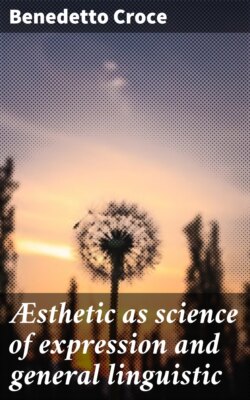Читать книгу Æsthetic as science of expression and general linguistic - Benedetto Croce - Страница 16
На сайте Литреса книга снята с продажи.
ОглавлениеLogical falsehood and æsthetic truth.
This confirms the truth of the ordinary remark to the effect that he who reasons ill, also speaks and writes ill, that exact logical analysis is the basis of good expression. This truth is a tautology, for to reason well is in fact to express oneself well, because the expression is the intuitive possession of one's own logical thought. The principle of contradiction itself is at bottom nothing but the æsthetic principle of coherence. It may be maintained that it is possible to write and to speak exceedingly well, as it is also possible to reason well though starting from erroneous concepts; that some, though lacking the acuteness that makes a great discoverer, are nevertheless exceedingly lucid writers; because to write well depends upon having a clear intuition of one's own thought, even if it be erroneous; not of its scientific, but of its æsthetic truth, which indeed is the same thing as writing well. A philosopher like Schopenhauer can imagine that art is a representation of the Platonic ideas. This doctrine is scientifically false, yet he may develop this false knowledge in excellent prose, æsthetically most true. But we have already replied to these objections, when observing that at that precise point where a speaker or a writer enunciates an ill-thought concept, he is at the same time a bad speaker and a bad writer, although he may afterwards recover himself in the many other parts of his thought which contain true propositions not connected with the preceding error, and therefore lucid expressions following upon confused expressions.
Reformed logic.
All researches as to the forms of judgements and of syllogisms, their conversions and their various relations, which still encumber treatises on Logic, are therefore destined to diminish, to be transformed, to be converted into something else. The doctrine of the concept and of the organism of concepts, of definition, of system, of philosophy and the various sciences, and the like, will occupy the field and alone will constitute true and proper Logic.
Those who first had some suspicion of the intimate connexion between Æsthetic and Logic and conceived Æsthetic as a Logic of sensible knowledge were peculiarly addicted to applying logical categories to the new knowledge, talking of æsthetic concepts, æsthetic judgements, æsthetic syllogisms, and so on. We who are less superstitious as regards the permanence of the traditional Logic of the schools, and better informed as to the nature of Æsthetic, do not recommend the application of Logic to Æsthetic, but the liberation of Logic from æsthetic forms. These have given rise to non-existent forms or categories of Logic, due to the adoption of altogether arbitrary and ill-considered distinctions.
Logic thus reformed will still be formal Logic; it will study the true form or activity of thought, the concept, excluding individual and particular concepts. The old Logic is ill called formal; it would be better to call it verbal or formalistic. Formal Logic will drive out formalistic Logic. To attain this object, it will not be necessary to have recourse, as some have done, to a real or material Logic, which is no longer a science of thought, but thought itself in action; not only a Logic, but the whole of Philosophy, in which Logic is also included. The science of thought (Logic) is that of the concept, as that of imagination (Æsthetic) is that of expression. The well-being of both sciences lies in exactly carrying out in every particular the distinction between the two domains.
Note to the Fourth Italian Edition.—The observations contained in this chapter on Logic, which are not all of them clear or accurate, should be clarified and corrected by means of the further treatment of the theme in the second volume of the Philosophy of the Spirit, dedicated to Logic, where the distinction between logical and historical propositions is again examined and their synthetic unity demonstrated.
